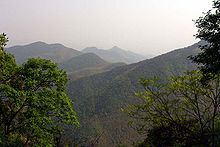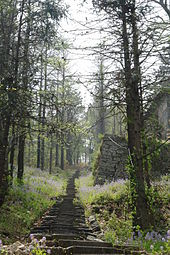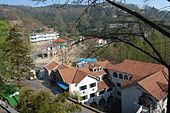- Mount Mogan
-
Mount Mogan (Chinese: 莫干山; pinyin: Mògàn Shān) is a mountain located in Deqing County, Huzhou, Zhejiang Province, China. It is sixty kilometers away from the city of Hangzhou and 200 km from Shanghai.
It is part of the Moganshan National Park and at its base is the small village of Moganshan.
Known for its cool temperatures during the scorching summers, it has long been the playground of the Shanghai elite in the past. Today, Moganshan mixes a country lifestyle with a mix of local inns and old villas built early in the 20th century.
Contents
History
According to Chinese legend, in the Spring and Autumn Period of 770- 476 BC, China’s most talented swordsmith Ganjiang, arrived in the mountains. It was here that he cast and forged a pair of special swords on the demand of the Emperor of Wu. Gan’s wife was called Moye, hence the name Mogan Mountains and the main tourist attraction Sword Pond.[1]
The crisp refreshing breezes of Mogan Mountain first enchanted foreigners in the 1880’s, where rooms and houses were rented from locals. This ideal summer retreat soon attracted the foreign community in Shanghai who came together, dug deep into their pockets and bought the mountain top for 50 dollars. Large European style villas, houses, churches and public halls were built for missionaries, businessmen, customs officials and their families. Many of these villas and houses are still standing, with some being turned into hotels and guesthouses operating today.
By 1910 approximately 300 foreigners, mostly Americans and British, had set up summer homes on the hill. The foreigners left the mountain top with the rise of the Communist party in 1949, where the villas were handed out to different work units or “danwei’s” from Hangzhou and Shanghai.[2]Geography
Moganshan is a major bamboo area, with lush bamboo forests on its slopes and surrounding areas.[3]
Tourism Today
Moganshan receives a variety of Chinese and foreign visitors for relaxation, hiking, and visiting a variety of scenic and historical spots, including the post-World War II villa of Chiang Kai-shek.
See also
References
External links
- Mogan Mountain (Chinese)
- Mogan Mountain Eco-Friendly
Zhejiang topics General Geography Cities • Huangyajian Peak • Mount Mogan • Mount Tiantai • Yangtze Delta • Grand Canal of China • Qiantang River • Oujiang River • Zhoushan Island • Hangzhou BayEducation Zhejiang University • Zhejiang University of Technology • Zhejiang Normal University • Shaoxing UniversityCulture Hangzhou dialect • Ningbo dialect • Wenzhou dialect • Jinhua dialect • Quzhou dialect • Shaoxing operaCuisine Visitor attractions National parks of China Beidaihe • Benxi Shuidong National Park • Mount Cangyan • Chengde Mountain Resort • Dian Lake • Dujiangyan Irrigation System • Mount Emei • Fuxian Lake • Mount Heng (Hunan) • Mount Heng (Shanxi) • Hexigten Global Geopark • Mount Hua • Huangguoshu Waterfall • Huanglong, Sichuan • Mount Huang • Jade Dragon Snow Mountain • Jinggangshan Mountains • Jiuzhaigou Valley • Mount Lao • Mount Li • Longmen Grottoes • Mount Luofu • Mount Lu • Lushan Quaternary Glaciation National Geopark • Mount Jiuhua • Mount Mogan • Pearl Shoal Waterfall • Pudacuo National Park • Mount Putuo • Qianshan National Park • Mount Qingcheng • Qinghai Lake • Mount Qingyuan • Mount Qiyun • Mount Sanqing • Sanshan Islands • Shilin (Stone Forest) • Mount Song • Taihu Lake • Mount Tai • Mount Tianzhu • Wudang Mountains • Wulingyuan • Mount Wutai • Wuyi Mountains • Xixi National Wetland Park • Yuelu Mountain • Yun Mountain • Zhangjiajie National Forest Park • Wangwushan - Yuntaishan National Park •Categories:- Mountains of China
- National parks of China
- Geography of Zhejiang
- Visitor attractions in Zhejiang
Wikimedia Foundation. 2010.



